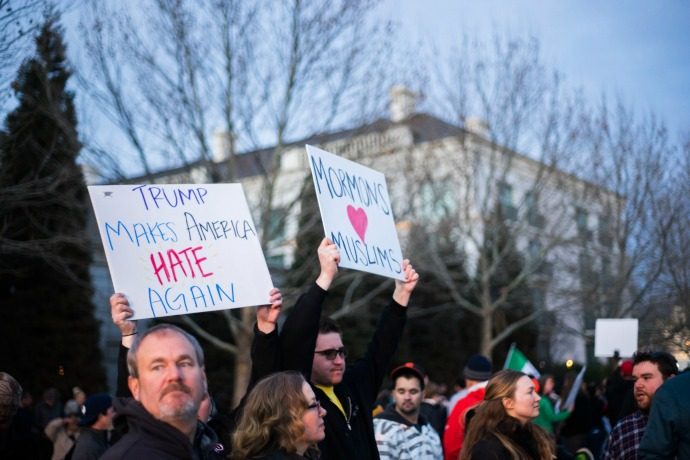Will Mormons vote for Donald Trump this November? With all the attention given to whether or not evangelicals will support Trump (and the related, if diversionary, question of whether those who do are actually “real” evangelicals), the question of Mormons in the 2016 election has largely been overlooked.
On one hand, Mormons make up less than two percent of the American population, a small sliver compared to evangelicals and Catholics.
But Mormons have also provided the Republican Party with one of its most solid voting blocs for half a century. In the last couple of presidential elections, Mormons have given the GOP around 80 percent of their support. Utah, where Mormons make up about 60 percent of the population, has not backed a Democrat for president since Lyndon Johnson’s landslide victory in 1964. With that history, a 2009 Gallup poll named Utah the “most Republican state.” In other western states like Nevada, Idaho and Wyoming, LDS citizens provide a reliable base for the Republican Party there.
Yet despite Mormon loyalty to the GOP, they have largely refused to lend their support to Trump.
Back in March, I wrote about Trump’s trouncing in the Utah caucus. Coming in third place with a paltry 14 percent of the vote, Trump faced a devastating loss to Ted Cruz who captured nearly 70 percent of Utah Republicans. Buzzfeed’s McKay Coppins explained Mormons’ rejection of Trump at the time owed to objections over his unsavory personal life and temperament but also to opposition to his proposals to ban Muslims from entering the country and his harsh anti-immigration rhetoric. Jana Reiss, a popular Mormon blogger, added that many Mormons recoiled from Trump’s demeaning treatment of women and his flippant statements about religious faith.
Still, Trump’s poor showing in the Utah caucus hardly ensured he would continue to struggle there in the general election. In 2008, John McCain suffered an even more crushing defeat in the state’s primary, scraping only five percent of the vote compared to Mitt Romney’s nearly 90 percent. Yet Utah quickly got behind McCain after he captured the Republican nomination that year, giving him around 62 percent support against Barack Obama.
But polling this summer has revealed Trump continues to face bleak prospects in Utah, a state he must win to gain the White House. A June, Salt Lake Tribune poll showed Trump and Clinton tied at 35 percent each, while an early August poll has Clinton with a slight lead.
While Trump’s numbers are dropping almost everywhere—a recent poll indicated Clinton has grabbed a four percent lead in Georgia, for example—the Utah numbers invite further investigation.
In Slate, historian Max Perry Mueller provided critical insight last week contextualizing Trump’s poor standing among Mormons within the LDS Church’s long history as victims of religious persecution and its more recent emergence as a global faith. Having once faced extermination orders, Mormons, Mueller argues, take umbrage with Trump’s proposed ban to bar Muslims from entering the United States, something they rightly see as an affront to religious liberty.
As members of a global church that has found increasing strength in Central and South America, Mormons have also recoiled at Trump’s harsh statements about Mexicans. Mueller astutely points out that Mexico boasts the LDS Church’s second largest Mormon population behind the U.S., and that it is “likely that there are today more nonwhite Mormons than white ones.”
Given all that, Mormon resistance to Trump’s candidacy clearly grows from both present circumstances and longer historical patterns. The sizeable number of Mormons who have libertarian leanings also may be resetting Utah’s political landscape this election year. (The Libertarian Party candidate Gary Johnson has been polling around 13 percent all summer.)
But in light of the support white evangelicals have given Trump, Mormons’ rejection of The Donald seems especially meaningful. Leaders of the #NeverTrump movement have worked hard since last summer to convince evangelicals they cannot support Trump, yet Trump continued to gain evangelical support throughout 2016. While the #NeverTrump crowd has remained voluble, they have also stayed markedly silent regarding Mormons’ opposition to Trump, a response indicative of longer historical patterns.
As I detail in my recent book, We Gather Together, evangelical-Mormon political partnerships have often revealed deeper religious strains. Although evangelicals spotted Mormons as some of their closest political allies in the 1970s and 1980s, they also worried that too close a political partnership might undermine longstanding evangelical treatment of Mormonism as a heretical cult. Amidst the social and cultural changes of the 1960s and 1970s, evangelicals often admiringly looked at Mormon families as a conservative bulwark against the nation’s sexual permissiveness and rising divorce rates. Yet, also fretful that Mormonism might grab evangelical converts, evangelical publications instead presented Mormon families as a front to cover up the faith’s polygamous past. Mormon virtue threatened evangelical teachings about its vice.
That virtue shines in Mormons’ refusal to back Donald Trump. Although they have long called themselves a “peculiar people” because of their separateness from the world and its ways, Mormons might consider adopting a new nickname after November. If they do reject Trump this fall, Mormons would be right to call themselves a “principled people” instead.





